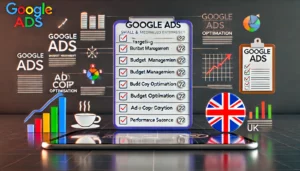The Ultimate Google Ads Performance Review Checklist for UK SMEs

Google Ads Performance Review: running Google Ads can be a game-changer for UK small and medium-sized enterprises (SMEs). With the right strategies, you can reach your target audience, boost your sales, and grow your business. This checklist will guide you through the critical steps to ensure your Google Ads campaigns are performing at their best.
Key Takeaways for Google Ads Performance Review
- Align your campaigns with your business goals to ensure every ad spend is working towards your objectives.
- Craft ads with strong calls to action and use high-performing keywords to attract the right audience.
- Monitor key metrics like impressions, clicks, and conversions to understand your campaign’s performance.
- Regularly audit your Google Ads to identify waste and refine your strategies.
- Use insights from your PPC data to enhance your SEO efforts and achieve better overall results.
Aligning Campaigns with Business Goal: The Winning Google Ads Performance Review
Aligning your Google Ads campaigns with your business goals is crucial for achieving success. This ensures that every penny spent contributes to your overall objectives, whether it’s increasing sales, generating leads, or boosting brand awareness.
Setting Clear Objectives
When you set off on a journey, it’s rare not to know your destination. The same goes for a marketing campaign. Setting SMART objectives for your campaign upfront means you will know how it measured up to expectations. A clear objective helps you stay focused and measure success accurately.
Ensuring Location Targeting Matches Your Audience
Location targeting is essential for reaching the right audience. Make sure your ads are shown in locations where your potential customers are. This not only saves money but also increases the chances of conversions. For UK SMEs, focusing on local areas can be particularly effective.
Evaluating Campaign Types for Goal Alignment
Different campaign types serve different purposes. Whether it’s Search, Display, or Shopping campaigns, choose the type that aligns best with your business goals. Evaluating your campaign types ensures that your ads are built with AI at its core, promoting your app or service where users are most likely to engage.
Crafting Effective Ads and Keywords
Creating Compelling Calls to Action
Your call to action (CTA) is the heartbeat of your ad. Make it irresistible by using persuasive language that speaks directly to your audience’s needs. Highlight the benefits they will gain, and don’t forget to test different ad formats and extensions to see what works best.
Optimising Mobile-Friendly Landing Pages
In today’s mobile-first world, your landing pages must be optimised for mobile devices. Ensure fast loading times, easy navigation, and clear, concise content. A seamless mobile experience can significantly boost your conversion rates.
Selecting High-Performing Keywords
Choosing the right keywords is crucial for your ad’s success. Focus on high-converting keywords that may be underutilised. Test these keywords with PPC to gain immediate visibility. Monitor their performance and adjust bids and ad copy as needed. By doing so, you’re not just chasing clicks—you’re building a foundation for sustained online success.
Monitoring and Reporting Key Metrics
Tracking Impressions, Clicks, and Conversions
Just like a shop owner keeps an eye on sales and stock, you need to track your Google Ads metrics. Impressions, clicks, and conversions are the basics. Impressions show how often your ad is seen, clicks tell you how many times people interact with it, and conversions show how many actions are completed, like sales or sign-ups. Keeping tabs on these helps you see what’s working and what needs tweaking.
Analysing Cost and ROI (Google Ads Performance Review)
Understanding your costs and return on investment (ROI) is crucial. You need to know how much you’re spending and what you’re getting back. Calculate your Cost Per Conversion to see if your ads are cost-effective. If you’re spending more than you’re earning, it’s time to rethink your strategy. Regularly reviewing these numbers helps you make smarter decisions.
Identifying Trends for Optimisation
Spotting trends can give you a big advantage. Look for patterns in your data to see what’s popular and what’s not. Maybe certain keywords perform better at different times of the year. Use this info to adjust your campaigns. By staying on top of trends, you can keep your ads relevant and effective.
Regularly monitoring these key metrics ensures your Google Ads campaigns are always on the right track. It helps you make informed decisions and optimise for better performance.
Optimising Bidding Strategies
Defining Your Bidding Strategy
To get the most out of your PPC campaigns, you need to set a bidding strategy that matches your goals. Think about your budget, where you want your ads to show up, and how tough the competition is for your keywords. For example, if you want to get more bookings, a Maximise Conversions strategy might be the best choice.
Incorporating Negative Keywords
Using negative keywords helps you avoid showing your ads to people who aren’t interested. This saves money and makes sure your ads reach the right audience. Regularly update your list of negative keywords based on search terms that don’t lead to conversions.
Google Ads Performance Review: Adjusting for Seasonality and Trends
Look at past data to see how your ads perform during different times of the year. Adjust your bids to take advantage of high-traffic periods and reduce spending during slower times. This way, you can make the most of your budget all year round.
Pro Tip: By strategically bidding on the right keywords, you can ensure that your ads appear where they are most likely to be noticed and clicked, leading to increased traffic and potential conversions.
Here’s a quick checklist to keep your bidding strategies sharp:
- Define your bidding strategy based on campaign goals
- Analyse historical trends for seasonality adjustments
- Identify and incorporate negative keywords
- Choose the right bid strategy for your campaign type
- Regularly audit your Google ads for optimisation
Conducting Regular Google Ads Audits
Identifying Areas of Waste
Regular Google Ads audits are essential for spotting areas where your budget might be wasted. By examining your campaigns closely, you can identify underperforming keywords, ads, and even entire ad groups. This helps you reallocate your budget to more effective areas, ensuring you get the most out of your investment.
Refining Strategies Based on Audit Results (Google Ads Performance Review)
Once you’ve identified areas of waste, it’s time to refine your strategies. Use the data from your audit to tweak your bidding strategies, adjust your ad copy, and optimise your landing pages. This continuous improvement cycle is crucial for staying competitive in the ever-changing landscape of Google Ads.
Staying Updated with PPC Marketing Trends
The world of PPC marketing is always evolving. To stay ahead, you need to keep up with the latest trends and updates. Regular audits help you stay informed about new features and best practices, allowing you to adapt your strategies accordingly. Partnering with experienced Google ads agencies can also provide valuable insights and keep your campaigns on the cutting edge.
Conducting regular Google Ads audits not only helps in identifying waste but also in refining your strategies and staying updated with the latest trends. This ensures your campaigns are always optimised for the best performance.
Enhancing SEO with PPC Insights (Google Ads Performance Review)
Using PPC Data for SEO Keyword Selection
Harness the power of your Google ads PPC campaigns to refine your SEO keyword strategy. By analysing which keywords yield the highest ROI in your paid ads, you can prioritise these for your organic content, ensuring you focus on the most profitable terms. Use PPC insights as a compass to navigate the vast sea of potential keywords, identifying those that not only drive traffic but also convert.
By integrating PPC keyword performance data into your SEO efforts, you can identify which terms are truly valuable to your business. This approach allows you to prioritise your SEO efforts more effectively, focusing on keywords that have proven their worth in paid search.
Consider the following steps to integrate PPC insights into your SEO strategy:
- Analyse PPC data to identify high-converting keywords.
- Test these keywords organically to see if they hold the same value.
- Adjust your SEO keyword strategy based on PPC performance metrics.
- Continuously monitor both PPC and SEO results to refine your approach.
Integrating PPC and SEO Strategies
Combining your PPC and SEO strategies can create a more holistic online presence. A London PPC agency can help you align these efforts seamlessly. By testing new keywords with PPC before committing to them in SEO, you can save time and resources. This integrated approach ensures that your marketing efforts are cohesive and mutually beneficial.
Measuring the Impact of Combined Efforts
To measure the impact of your combined PPC and SEO efforts, track key metrics such as traffic quality, user engagement, and conversion rates. A PPC audit can help you identify areas where your strategies overlap and where they can be improved. By continuously refining your approach, you can ensure that both your PPC and SEO efforts are driving the best possible results for your business.
Google Ads Performance Review Conclusion
In summary, when attempting a Google Ads performance review you need to follow this structured approach and this is key to the success of your UK SME. By following this checklist, you can ensure your campaigns are aligned with your business goals, your ads are engaging, and your targeting is spot-on. Regularly reviewing and optimising your ads will help you stay ahead in the competitive market. Remember, the digital landscape is always changing, so stay proactive and keep learning. With the right approach, your Google Ads can drive significant growth for your business.
Frequently Asked Questions for Google Ads Performance Review
What are the key objectives for a Google Ads campaign?
The main goals for a Google Ads campaign can be to increase website traffic, generate leads, boost sales, or raise brand awareness. Your specific goals will depend on your business needs.
How can I make sure my ads reach the right audience in the UK?
To target the right audience, use location settings to focus on specific areas in the UK where your potential customers are located. This ensures your ads are seen by people who are most likely to be interested.
What makes a good call to action in an ad?
A good call to action (CTA) is clear, and concise, and tells the user exactly what you want them to do, like ‘Buy Now,’ ‘Sign Up,’ or ‘Learn More.’ It should create a sense of urgency or provide a benefit.
Why is it important to have mobile-friendly landing pages?
Many users browse the internet on their phones. Mobile-friendly landing pages ensure a good user experience, which can lead to higher conversion rates and better ad performance.
How do I choose the right keywords for my campaign?
Select keywords that are relevant to your business and that potential customers might use when searching for your products or services. Use tools like Google Keyword Planner to find high-performing keywords.
What metrics should I monitor to gauge the success of my Google Ads?
Key metrics to monitor include impressions, clicks, conversions, and cost per click (CPC). These metrics help you understand how well your ads are performing and where you might need to make adjustments.
Author
Search Blog
Free PPC Audit
Subscribe to our Newsletter
The Voices of Our Success: Your Words, Our Pride
Don't just take our word for it. With over 100+ five-star reviews, we let our work-and our satisfied clients-speak for us.
"We have been working with PPC Geeks for around 6 months and have found Mark and the team to be very impressive. Having worked with a few companies in this and similar sectors, I rate PPC Geeks as the strongest I have come across. They have taken time to understand our business, our market and competitors and supported us to devise a strategy to generate business. I value the expertise Mark and his team provide and trust them to make the best recommendations for the long-term."
~ Just Go, Alasdair Anderson




